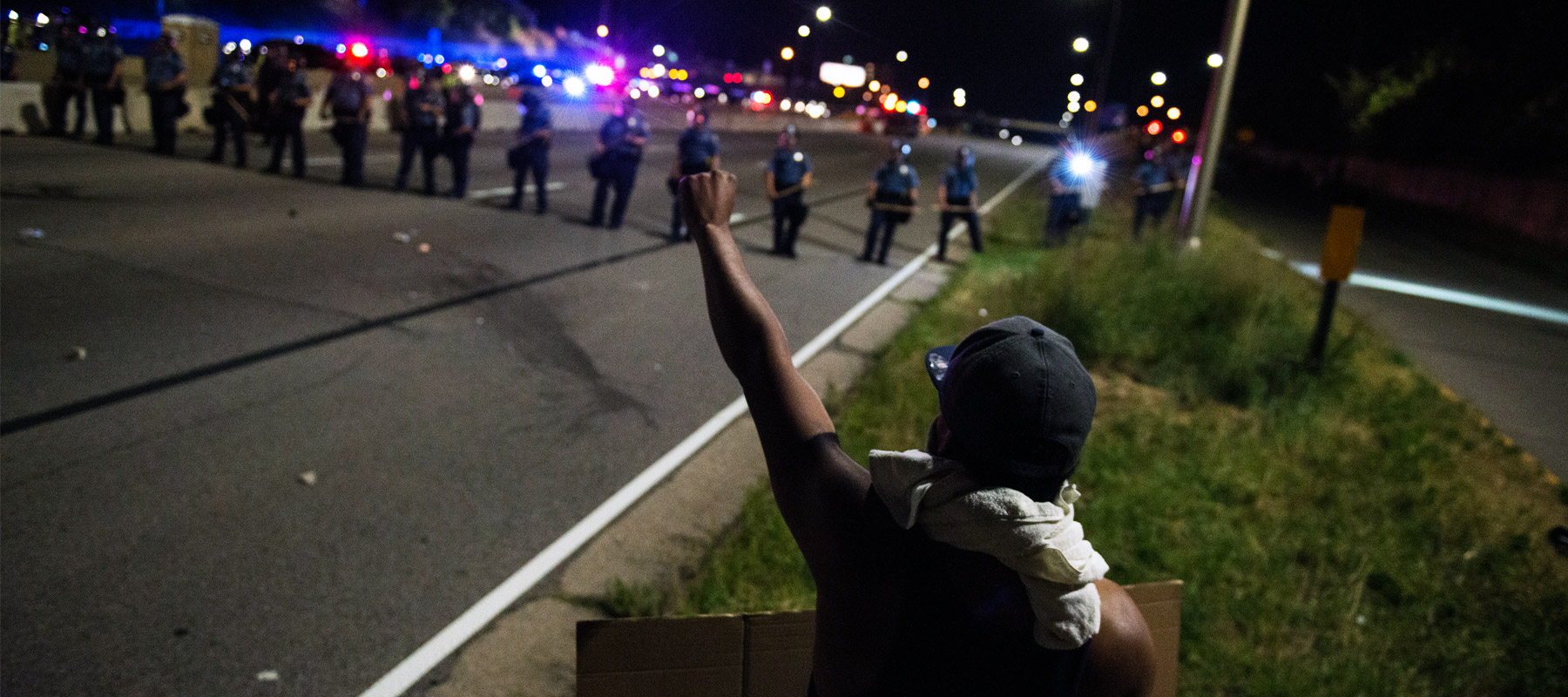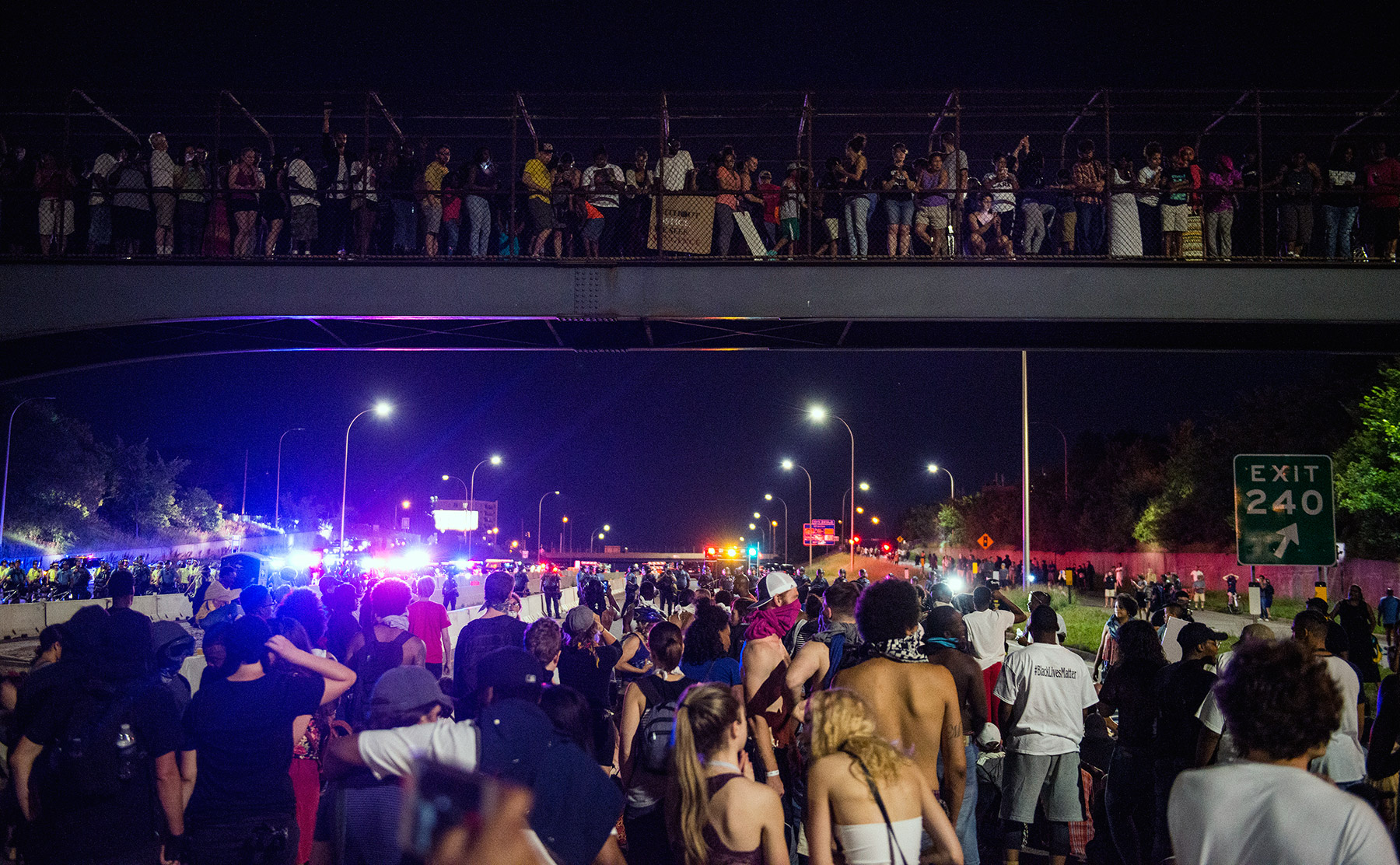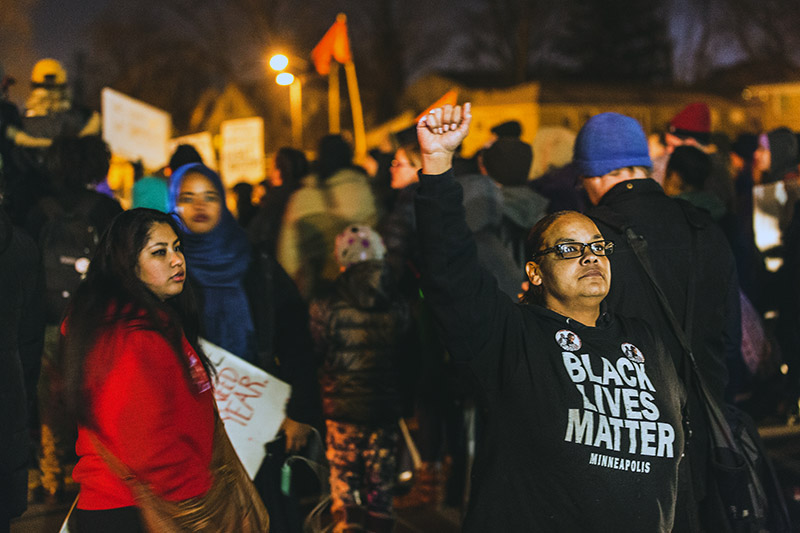
A protestor raises his fist during the shutdown of highway I-94 on July 9, 2016 in St. Paul, Minn., in response to the police killing of Philando Castile. (Photo by Stephen Maturen/Getty Images)
Law Enforcement Has Quietly Backed Anti-Protest Bills in at Least 8 States Since Trump’s Election
And that may be the tip of the iceberg.
April 16 | Web Exclusive
Minneapolis police union president Lt. Bob Kroll told In These Times that he lobbied Minnesota lawmakers to advance a statewide law clamping down on protests—legislation that civil liberties advocates say targets Black Lives Matter.
The pending bill, HF 390/SF 676, would significantly increase fees and jail time for protesters who block highways, a common civil disobedience tactic, including at protests against police killings. According to the ACLU of Minnesota, the proposed legislation “chills dissent” and constitutes an “attempt to silence Black Lives Matter movement.”
“I knew they were trying to pass it last year, and I encouraged them to do it again,” Kroll told In These Times.
Kroll has faced numerous accusations of racism for, among other comments, likening protests against police killings to “the local version of Benghazi” in 2015 and calling Black Lives Matter a “terrorist organization” in 2016.
His acknowledgement of the lobbying by his union, Police Officers Federation of Minneapolis, raises concerns that law enforcement is pressuring legislators to clamp down on protests—and specifically, on protests against police violence. “Cops are going to keep pursuing ways to keep themselves above the fray and unaccountable for the things they do,” says Tony Williams, a member of the MPD150, a police abolitionist project that recently released a “150-year performance review of the Minneapolis Police Department. “It's a naked case of self-interest more than anything else.”
Minneapolis police aren’t alone: According to research conducted for In These Times in partnership with Ear to the Ground, law enforcement in at least eight states—Arizona, Florida, Georgia, Iowa, Minnesota, Missouri, Washington and Wyoming—lobbied on behalf of anti-protest bills in 2017 and 2018. The bills ran the gamut from punishing face coverings at protests to increasing penalties for “economic disruption” and highway blockage to criminalizing civil protests that interfere with “critical infrastructure” like oil pipelines.
Emboldened by the Trump administration, at least 31 states have considered 62 pieces of anti-protest legislation since November 2016, with at least seven enacted and 31 still pending. The full scope of police support for these bills is not yet known. As in the case of Kroll, police support often takes place in private meetings, far from the public eye.
That police are playing any role in this wave of anti-protest legislation is raising alarm among organizers and civil liberties advocates. Traci Yoder, director of research and education for the National Lawyers Guild, a progressive bar association, is the author of a recent report on the forces behind the wave of anti-protest bills, which include conservative groups like the American Legislative Exchange Council, corporations like as Energy Transfer Partners (the company behind the Dakota Access Pipeline) and state Departments of Homeland Security.
“We are deeply concerned about the role of law enforcement agencies and leaders supporting the current wave of anti-protest legislation,” Yoder tells In These Times. “We see this as a direct response to the success and visibility of recent movements of color such as Black Lives Matter and #NoDAPL. The collusion we are seeing between law enforcement, lawmakers and corporate interests is undemocratic and designed to deter social movements for racial and environmental justice.”
Beyond Minnesota
Following uprisings in Ferguson, Standing Rock, Baltimore and elsewhere, the policing of protests became a hot topic at law enforcement conferences and within law enforcement publications. But law enforcement like Lt. Bob Kroll are not merely discussing how to apply the law to protests, but actively lobbying for new laws curbing public action.
According to research by In These Times and Ear to the Ground, police associations, police unions, district attorneys or officers in leadership positions lobbied in favor of “protest suppression” laws in 2017 and 2018 in at least eight states: Arizona, Florida, Georgia, Iowa, Minnesota, Missouri, Washington and Wyoming.
| State | Year Introduced | Bill | Law Enforcement Support | Result |
|---|---|---|---|---|
| Arizona | 2018 | HB 2007: Wearing “disguise at protest” | Rebecca Baker of the Maricopa County Attorney’s Office | Weakened, but signed |
| Florida | 2017 | SB 1096/HB 1419: Blocking Highways | Fraternal Order of Police | Died |
| Georgia | 2017 | HB 452: Domestic Terrorism, including anyone who “disables or destroys” a highway/street or a public building | Fraternal Order of Police | Signed |
| Iowa | 2017, 2018 | SF 426: Blocking Highways; SF 2222: Blocking Highways | Iowa State Police Association | Did not pass in 2017, but reintroduced in 2018 and pending |
| Iowa | 2018 | SF 2235: Critical Infrastructure | Iowa Dept of Homeland Security | Passed, awaiting governor’s signature |
One bill was signed, two passed but were vetoed, and a 2018 Iowa bill to protect “critical infrastructure” has passed, but still awaits its governor’s signature. Four are still pending, and the rest died or were voted down.
In other states, top sponsors of protest suppression legislation had close ties to law enforcement. In Tennessee, for example, the main sponsor of a bill that was signed into law in 2017 was a member of Blue Lives Matter Tennessee.
These state-level efforts appear to be compounding the repressive national political climate, where the Trump administration has aggressively prosecuted more than 200 Inauguration Day protesters, and the president has openly endorsed police brutality.
Support for state-level anti-protest laws extends far beyond police departments, as showcased in Minnesota, where an action item to require “prosecution of protestors who impede emergency traffic” was approved by the Republican Party Convention in 2016.
And the cozy relationship between Minnesota state lawmakers extends far beyond anti-protest legislation. Representative Zerwas and Minnesota State Senator Tony Cornish, who have advanced the anti-protest legislation, have also advanced law enforcement’s agenda on a number of other issues, including body worn cameras, school police and new protections for police dogs.
As highway-blocking protests continue, some in Minneapolis remain skeptical that police are—or will ever be—on the public’s side.
“Police officers and police unions try to portray themselves as nonpartisan enforcers of laws,” says Williams. “But if you look at the history of police departments in Minneapolis and across the country, there's a documented history of that not being true. Police have an agenda.”
Above: A protestor raises his fist during the shutdown of highway I-94 on July 9, 2016 in St. Paul, Minn., in response to the police killing of Philando Castile. (Photo by Stephen Maturen/Getty Images)

Protestors shut down highway I-94 on July 9, 2016 in St. Paul, Minn., in response to the police killing of Philando Castile the previous month. Minnesota legislators introduced a 2017 bill to penalize highway blockage. (Photo by Stephen Maturen/Getty Images)
Accusations of racism
Speaking over the phone with In These Times, Kroll elaborated on his role in lobbying for the Minnesota bill. “We have ongoing meetings with politicians, and one of them, Nick Zerwas, we encouraged him to bring it again,” Kroll explained.
State Rep. Zerwas—who did not respond to a request for comment—is author of and principle force behind the bill, which would make the obstruction of an interstate or a major roadway to an airport punishable by up to $3,000 and a year in jail. Zerwas first introduced the bill in January 2017, then tried to work the language into an omnibus spending bill, but was thwarted by Gov. Mark Dayton. In March 2018, Zerwas revived the original bill. Like those of all Minnesota state representatives, Zerwas’ communications are exempt from the state’s sunshine law.
Ben Feist, legislative director of the ACLU of Minnesota, was surprised to learn of Kroll’s comments. “This is the first I’ve heard” of police support for either iteration of the bill, he says. “In all of the hearings that have occurred last session and this session, law enforcement and their usually very vocal lobby have been silent. Lawmakers have not said that law enforcement has asked for this.”
Protestors shut down highway I-94 on July 9, 2016 in St. Paul, Minn., in response to the police killing of Philando Castile the previous month. Minnesota legislators introduced a 2017 bill to penalize highway blockage. (Photo by Stephen Maturen/Getty Images)

Left: Whatcom County Prosecutor Dave McEachran (L) and Sheriff Bill Elfo (R) testify before the Washington state Senate in March 2017 about a Dakota Access Pipeline protest that blocked Interstate 5. McEachran speaks in favor of a bill to penalize "economic disruption," including highway blockage and interference with pipelines. (TVW screen shot) Right: Minneapolis police union president Bob Kroll, who told In These Times he lobbied for a bill to penalize protests that block highways. (First Responder Roadway Priority/YouTube/screen shot)
But not everyone was surprised. Williams tells In These Times, “There is a long history of police advocacy groups, specifically police unions, using their cultural capital as police to convince legislators to pass policy on their behalf.” Williams points out that in 2012, for example, the Minneapolis Police Federation successfully pressed lawmakers to pass a law that reduces the power of a statewide panel tasked with investigating police misconduct.
When he spoke with In These Times for this story, Kroll again denigrated protests against police killings of Black Minnesotans, including 24-year-old Jamar Clark and 32-year-old Philando Castile.
“They impede normal people's travel plans, holidays, you name it,” Kroll said of the protests, which have been used across the country by Black Lives Matter organizers responding to police killings. “They keep working people away from their destination, from childcare. These are a group of people funded by a radical left-wing organization that disrupts the lives of normal people.”
Asked to clarify who he believes is funding these groups, Kroll replied: “George Soros … He's a big funder of things like that. The groups that we're talking about take part in blocking freeways and airports, disrupt vehicle traffic in and out of the Super Bowl.”
In response to Kroll’s latest remarks, Williams said, “A vast majority of people who have protested police brutality in Minneapolis or around the country are not funded or even supported by resources in that work at all. Certainly not to the level of a group like the police union is.”

A community member holds up a fist outside the Minneapolis Police Federation union office, following the raid eviction of demonstrators camped out in front of the Minneapolis Police Department's 4th Precinct location, blocks from where Jamar Clark was killed by police weeks prior. (Tony Webster/Flickr/Creative Commons)
“What groups are fundamentally demanding is a way to keep our communities safe from police officers,” Williams continued. “It’s not a radical thing to want our community to be safe. But the police union and Bob Kroll have shown themselves to be radical far-right individuals with ties to white supremacy.”
In a 2016 interview, Kroll admitted he is a member of City Heat, a motorcycle club that has been denounced by the Anti-Defamation League (ADL) for its tolerance for white supremacy (the ADL often collaborates with police departments). When asked about this affiliation, he abruptly ended his interview with In These Times. 
is editor of the Ear to the Ground newsletter, an exclusive “civic intelligence” service that mines local newspapers and state legislatures from across the country.
Sarah Lazare is web editor at In These Times. She comes from a background in independent journalism for publications including The Intercept, The Nation and Tom Dispatch. A former staff writer for AlterNet and Common Dreams, Sarah co-edited the book About Face: Military Resisters Turn Against War.
Never miss a story. Subscribe to the free In These Times weekly newsletter:
